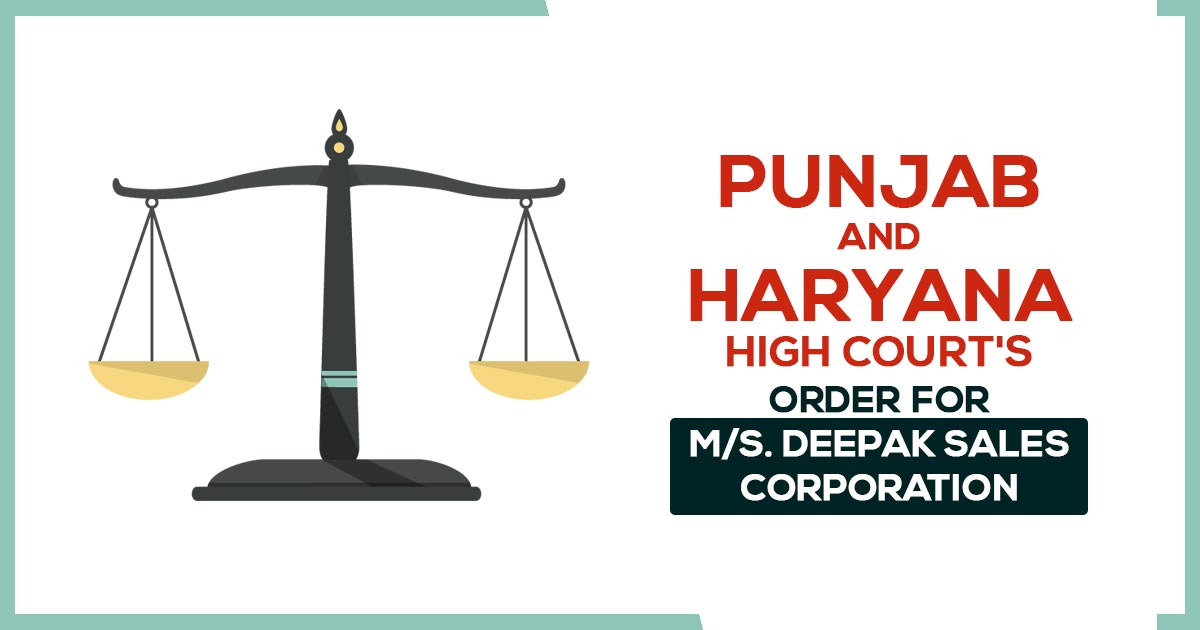
The Punjab and Haryana High Court, in the matter of M/s. Deepak Sales Corporation v. Union of India [CWP No. 283 of 2023 dated September 21, 2023], has passed a writ petition appeal. The court ruled that the demand for interest and fine cannot be sustained if the inaccurately claimed credit is reversed and the assessee did not use it.
Key Facts of the Case:
The petitioner, M/s. Deepak Sales Corporation is a possession of the trading firm that was earlier registered under the Haryana VAT Act, 2003. After the implementation of GST, the Petitioner registered itself under the CGST Act. The Petitioner mistakenly entered the ITC amount as Rs.14,05,78,663/- instead of Rs.1,40,57,836/- while submitting returns and entering details in the electronic credit ledger (ECL) for August 2017.
Consequently, the Petitioner claimed an excess ITC of Rs.12,65,20,827/-. Upon realizing the error, the Petitioner contacted the Revenue Department, the respondent in this case, via email to seek guidance on reversing the ITC. However, as no response was received from the Respondent, the Petitioner could not reverse the excess ITC while submitting the return for July 2018. Eventually, the Petitioner rectified the error and reversed the excess ITC.
The Petitioner received a Show Cause Notice dated October 27, 2020 (SCN) demanding interest and applicable charges. The Respondent, through an Order dated March 31, 2021, confirmed the interest demand.
Challenging the Order, the Petitioner filed an appeal. In the Impugned Order dated April 29, 2022, the Respondent held that interest is payable in the amount of Rs.21,13,354/-, which the petitioner utilized wrongly. The Respondent also imposed a penalty for the same.
Dissatisfied with the contested Order, the Petitioner filed a writ petition before the Hon’ble Punjab and Haryana High Court. The Petitioner challenged the disputed Order, and SCN because the Proper Officer did not issue the notice. Additionally, the Petitioner argued that the excess ITC was not utilized, and the Respondent did not respond to the Petitioner’s query regarding the reversal of the Input tax credit under GST. Therefore, the Petitioner should not be liable to pay any interest or charges.
Issue on Penalty and Interest
The main issue was whether penalty and interest could be imposed when the credit wrongly availed is not utilized by the Assessee.
Punjab and Haryana High Court Decision
The Hon’ble Punjab and Haryana High Court, in the case of CWP No. 283 of 2023, made the following rulings:
- The court noted that under Section 50(3) of the CGST Act, a taxpayer who seeks an unjustifiable or excessive allowance of ITC must settle interest on such claim, not more than twenty-four percent.
- Referring to the judgment of Commissioner of Central Excise v. Jagatjit Industries Ltd. [S.T.A. No. 41 of 2010 dated December 24, 2010], it was noted by the court that when CENVAT credit was inappropriately demanded and subsequently reversed before utilization, the Revenue Department could not reasonably justify the request for interest. The court also referred to the judgment of CCE Rohtak v. Grasim Bhiwani Textile Ltd. [C.E.A No. 38 of 2016 dated May 15, 2018], which stated that when CENVAT credit is reversed prior to being used, the requirement for interest and penalty becomes unjustifiable.
- The court noted that the legislative purpose behind the provision is that the erroneous reflection of ITC in the ECL is not enough to initiate penal actions unless the Input tax credit is used. Therefore, no demand for interest or penalty can be upheld if the wrongfully reversed claim is not utilized by the taxable person.
- The court considered that when it becomes obvious that the excess ITC entered in the ECL was not utilized and was reversed before utilization, the demand for interest and penalty cannot be sustained. As a result, the Petitioner should not be subjected to such impositions.
- Accordingly, the court held that the Petitioner is not liable to pay interest or penalty on the excess ITC mistakenly entered in the ECL. Therefore, the disputed Order is overruled, and the appeal is allowed.
| Case Title | Deepak Sales Corporation & Anr. Vs. Union of India and Others |
| Neutral Citation No.2023 | PHHC:131711-DB |
| Date | 21.09.2023 |
| Petitioner | Mr. Amrinder Singh, Advocate |
| Respondent | Mr. Rishabh Kapoor, Senior Standing Counsel |
| Punjab and Haryana High Court | Read Order |









